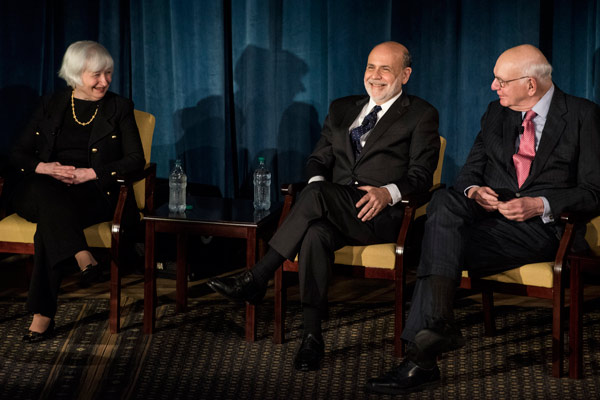Fed chairs: Yuan unlikely to threaten dollar
By Paul Welitzkin in New York (chinadaily.com.cn) Updated: 2016-04-08 11:00
 |
|
From left: Federal Reserve Chair Janet Yellen,former Federal Reserve Chair Ben Bernanke and former Chair Paul Volcker smile during a panel discussion at the International House in New York on Thursday. Andrew Renneisen / AFP |
Current Fed Chair Janet Yellen and three of her predecessors, Ben Bernanke, Alan Greenspan and Paul Volcker, discussed the role of the Fed at the International House in New York on Thursday. All were in attendance except Greenspan, who participated via video link.
At the end of the program, an audience member posed a question on the yuan (renminbi), noting its inclusion in the International Monetary Fund's reserve currency basket late last year.
Moderator Fareed Zakaria of CNN then asked the panel if the yuan posed a threat to the dollar's role as a preferred currency.
"The yuan is getting close to being a floating currency, "said Greenspan, who headed the Federal Reserve from 1987-2006. He noted that while the yuan is gaining acceptance, private holdings of the currency are still "quite low", which suggests the dollar will still be a preferred form of payment.
Volcker, who presided over the Fed from 1979 to 1987, said the dollar will remain a desired international currency as long as "we take care of our economy".
Ben Bernanke, whom Yellen replaced in 2014, described the benefits of being an international currency as modest and also said there were costs associated as well.
"The Chinese have taken this as a symbolic step, which it is," Bernanke said. He said that if the yuan continues to gain international acceptance, "this will be good, because it means China has opened up its markets and financial system."
Panelists were asked if the Fed, which has a mandate to maximize employment, stabilize prices and manage long-term interest rates in the US, needs to be more cognizant of the role its decisions have on the global economy.
Greenspan said the Fed can't disassociate the US from the rest of the world. "It would be foolish if we acted in an isolated manner," he said.
Yellen said the Fed does attempt to "minimize any adverse spillover" from its policies. "When the US is doing well, this tends to be a plus for the world," she said.
Yellen said the US economy continues to recover from the 2008 financial crisis and rejected claims voiced in the US presidential campaign that the economy was doing worse than statistics indicated.
"The labor market is healing, and the economy is on a solid course. We are not in a bubble," she said.
Yellen said the Fed's move to raise interest rates last December was not a mistake, noting that indicators at the time showed progress toward the Fed's labor market and inflation goals.
Because the global economy has experienced "relatively weak" growth despite positive signs in the US, Yellen said that the Fed will be cautious on future interest rate increases.
The tenures of the four participants cover more than one-third of the Fed's 102-year history. Each chair oversaw the US central bank during such difficult economic times, ranging from double-digit inflation in the 1970s, the global banking and financial market crises of the 1980s and 1990s and, beginning nearly a decade ago, the worst financial crisis and recession since the Great Depression.
The program, called When the Federal Reserve Speaks, the World Listens, launched a speakers program honoring Volcker at the International House, a residential dormitory for foreign students.
paulwelitzkin@chinadailyusa.com







